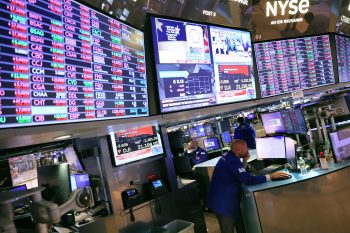TEXT OF INTERVIEW
Scott Jagow: Wall Street is now paying a price for backing risky mortgages. Investment banks like Bear Stearns are taking a big hit. This week, Wall Street was hoping the Federal Reserve would come to the rescue. Start lowering interest rates, help steady the up and down markets.But the Fed didn’t touch interest rates. It wasn’t really very sympathetic. No, the Fed was more worried about inflation than the subprime mess. Our economics correspondent Chris Farrell joins us. Chris, what’d you think of the Fed’s response?
Chris Farrell: Well my initial reaction was what planet is the Fed from? They’re worried about inflation for the past four months, the inflation numbers have been coming down, I mean come on, what are they talking about, inflation? What inflation? But then I settled down. I thought, y’know, I actually kinda like this Ben Squeeze. I think this is the Ben Squeeze.
Jagow: Ben Bernanke Squeeze?
Farrell: Ben Bernanke Squeeze. And what he’s doing is he’s saying ‘you know what, Bear Stearns? You’re an investment bank. You guys made millions and millions of dollars last year. I’m not gonna bail you out. I’m not gonna bail out Wall Street.’
Jagow: Hmm. So you think the Fed is taking a stand here instead of caving into Wall Street pressure and lowering interest rates and making things all better?
Farrell: And you know I think that what the fed is simply saying is, you know, we’ve gone through this long period for time where investment bankers made all this money ignoring risk and we had all this cheap money out there. Well now you know the bill’s coming due, and um, you believe in markets? You believe in free markets? Hey the Fed believes in free markets.
Jagow: But Chris, while the courage of the Fed here is admirable let’s say, can the Fed really afford to back off this much and let the markets crumble?
Farrell: I think so and for two reasons. The first reason: Corporate balance sheets are very strong. Companies have a lot of cash. So that’s one safety valve. The other safety valve is the global economy. The global economy is growing strong. If you look at the recent earnings season we went through Scott, corporate earnings of the Standard & Poor’s 500 companies, they were decent, matter of fact, decent to good. But the reason why they were decent to good is not what was going on here in the U.S., it’s because what was happening overseas and the sales that they were making overseas. So I think that those two factors are giving the Fed a little bit of confidence to stand firm. This nonsense about inflation, I mean basically it’s all nonsense. I think they just can’t say what they’re really doing which is let’s let the market work, lenders had gotten too careless so we’re gonna sit back and we’re gonna just let some of these loans go bad, we’re gonna let some people go belly up and we don’t think the credit squeeze will turn into a credit crunch.
Jagow: All right, our economics correspondent Chris Farrell.
Farrell: Thanks a lot.
There’s a lot happening in the world. Through it all, Marketplace is here for you.
You rely on Marketplace to break down the world’s events and tell you how it affects you in a fact-based, approachable way. We rely on your financial support to keep making that possible.
Your donation today powers the independent journalism that you rely on. For just $5/month, you can help sustain Marketplace so we can keep reporting on the things that matter to you.


















